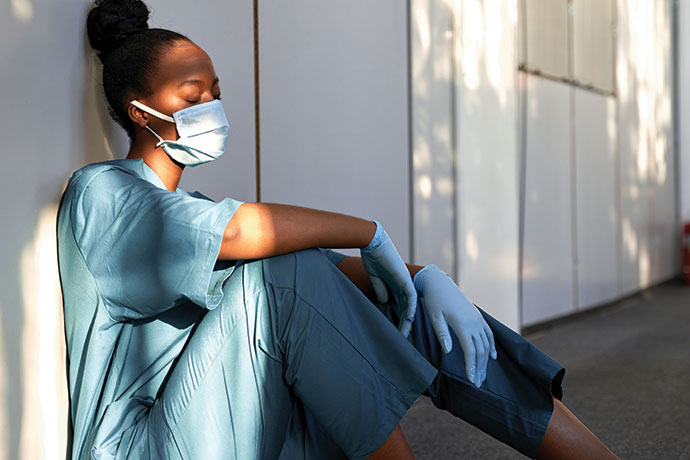With the changes COVID has brought to our society, everyone’s stress levels have increased. Being separated from our loved ones, fear of catching this serious illness and even the loss of favorite activities like going to the movies and gathering with friends have created stressful changes in our lives. It’s important to recognize these stresses and develop healthy coping mechanisms.
There are three basic types of stress. Everyone deals with the everyday stresses of living in civilization. We have to pay bills, drive in traffic, get ourselves and our children ready for work and school and keep the pantry stocked. Minor incidents like having to buy a new washing machine or deal with a broken car can amplify these everyday frustrations. Even welcome events, such as planning a wedding or big trip, can upset a person’s equilibrium.
The second type of stresses are major life events. Losing a job, getting divorced or being diagnosed with an illness creates a much higher degree of stress. As the pressure increases, so can the level of our reactions, such as a sense of hopelessness or even major depression with suicidal thoughts.
The highest level of stress, known as traumatic stress, occurs with such events as assault, major injuries or natural disasters. When a person recognizes that they were almost killed, their psyche may suffer severe changes, even permanent scarring. This type of incident usually causes deep changes in personality and outlook, sometimes diagnosed as post-traumatic stress disorder (PTSD). Fortunately, over time, most people find their equilibrium again, although permanent mental and psychological dysfunction is common.
The body reacts to stress through a fight-or-flight hormonal burst with an elevation of adrenaline. The heart beats faster to provide more blood to the muscles. Blood supply to the bowels may be reduced, causing either constipation or diarrhea. The pupils dilate, and the bladder may spasm. Some people get muscle twitching, and so-called “tension headaches” are common. Other common symptoms include sleeplessness, depression and arguments with loved ones. Libido often falls, although some people deal with stress with increased sexuality.
Long-term stress can cause high blood pressure, mental health issues and heart arrythmias — and even lead to heart attacks and strokes. Some people react to stress with eating disorders, either losing weight or overeating. Skin disorders such as acne and hives are common, as well as psychologically induced excess scratching. Hair loss may be an issue. Some people develop stomach problems such as reflux or ulcers.
Not all daily life stresses are harmful. People learn to cope and can use the stress to focus and develop motivation. The first step is to recognize its existence. Symptoms suggestive of increased stress include having trouble sleeping, feeling fatigued, losing your joy of life or becoming easily angered. Substance abuse, such as increased alcohol use, may be another sign of trying to cope.
There are many ways to deal with stress. One is developing regular routines, particularly exercise. A 30-minute walk once a day charges your endorphins and allows a lot of stress to dissipate. Yoga or meditation helps, too. If you have time, taking a camping trip or a hike through a forest has been shown to lower blood pressure and reduce stress.
Many people find that religion helps restore their inner peace; faith that God is looking out for you can be very comforting. Keeping up an active social network, such as Facebook or chat groups, can provide an outlet for stress and a sympathetic ear. Activities such as jigsaw puzzles and video games are relaxing and intellectually stimulating. A healthy sex life increases endorphins. Pets have been shown to help reduce stress, too, so consider snuggling up in your favorite easy chair with a good book and a cat on your lap.
Avoiding stressful activities might not be as difficult as it sounds. Those who get worked up by politics can find that taking a break from reading the news makes a huge difference. Instead of watching horror movies or competitive games on television, find a romance or comedy. When your spouse loads the dishwasher wrong, give him a hug.
Sometimes stress becomes severe enough to require professional help. Depression or high anxiety levels can interfere with daily activities, enough so that prescription medications may provide the necessary soothing balm. In particular, if you or someone you know is feeling suicidal, seek professional help immediately. The National Suicide hotline is 1-800-273-8255, with live chat available 24/7.
We all live with daily stresses. Learning to channel those stresses will lead to a happy and healthy life.
Dr. Philip L. Levin is a retired emergency medicine specialist in Gulfport. Learn more or contact him at www.Doctors-Dreams.com.



